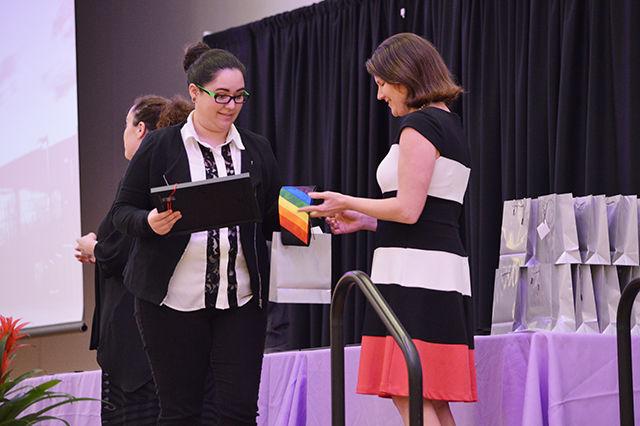 " />
" />
Kaydee Gawlik
Zane Burns, a senior studying biochemisty and minoring geology, accepts their award and "Swag Bag" during Lavender Graduation in Mountains Ballroom on Tuesday, April 19, 2016. Lavender Graduation is an annual ceremony that honors lesbian, gay, bisexual, transgender, and ally students and honors their achievements and contributions to the university. Lavender Graduation began in 1995 at the University of Michigan by Dr. Ronni Sanlo.
The GLBT Center hosted its annual Lavender Graduation Ceremony Tuesday night, celebrating the achievements of 23 undergraduates and four graduate students. Their work was recognized, along with the fact that there is still a great deal of work left to be done for coming graduates to accomplish to ensure all LGBT graduates can be honored openly and live authentically.
“[They should be recognized] not only for their achievements but for surviving their college years,” said Ronni Sanlo, former director of the University of Michigan LGBT Campus Resource Center and creator of the Lavender Graduation Ceremony, in a statement.
Sanlo said she wanted to recognize LGBT students for doing more than just receiving their diplomas but also for the challenges they face due to their identities. Since its creation in 1995, it has become a tradition for universities nationwide.
Brian Mathis, associate director of CSLEPS and an NC State alumnus, spoke to the graduates about “living and leading with authenticity.” Mathis told attendees of his coming out story, stating that the Technician accidentally outed him several years ago by writing, “Brian Mathis, who is gay…” in a story when he was a student.
Mathis addressed why it is important for him to live and lead authentically as a “gay, white and privileged man.”
“If you truly want to live and lead with authenticity, you need to remember that itself is privilege, and speaking up and speaking out about environments and about issues that may or may not impact your experience and your identity, that is important,” Mathis said.
Mathis emphasized the importance of living authentically because it gives others permission to do the same.
“When we do not give permission for others to live authentically we’re ultimately being complicit in these structures that say ‘only identities that we’re comfortable with are identities that are allowed to be authentic,’” Mathis said.
Ian Pike, a senior studying agricultural science, shared a message on the three “eras” of finding his gender identity and what the GLBT Center has meant to him throughout his time at NC State.
“I started out at State eight years ago as a Christian girl in computer science, questioning my sexuality,” Pike said. “I stand before you today as a newly engaged, bisexual man, questioning my religion.”
Pike explained that when he first attended NC State, the GLBT Center was located in an “actual closet” in the old Talley building, which then became a transitional space in Harrelson Hall and is now found on the fifth floor of Talley Student Union.
“I’m not saying that the designers meant for Talley to be an excellent metaphor for a trans person, but I will say as an institution, a community and even a state, if they invest time in the safety and development of its people, the transformation can be beautiful,” Pike said.
He reminded the audience that the journey of self-discovery concerning sexual orientation and gender identity is “special and unique to everyone.”
“We must be cognizant of this and not put people down for where they are or how they got there,” Pike said. “As an institution and a community, we must meet people where they are without causing them to move on before they’re ready.”
Pike shared his hopes that the NC State community will continue to grow in its efforts to support those in the LGBT community.
“Now’s a time for celebration but not a time for complacency,” Pike said.